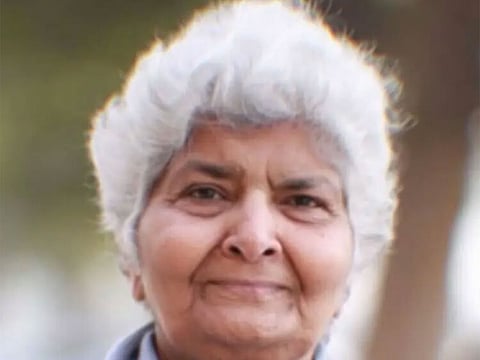Dr Arfa Sayeda Zehra, Pakistan’s eminent scholar and humanist, dies at 83
Tributes pour in for the renowned educationist and Urdu scholar who inspired generations

Dubai: Pakistan on Monday mourned the passing of Dr Arfa Sayeda Zehra, one of its most respected educationists, human rights advocates, and literary scholars. She was 83.
Dr Zehra’s niece, Ameena Kamal, confirmed to Dawn that the scholar passed away in Lahore after a prolonged illness.
“She will be laid to rest in the family graveyard in Cavalry Ground,” she said.
A revered name in academia, Urdu literature and social reform, Dr Zehra dedicated more than five decades to teaching, research and public service. Known for her sharp intellect, humility and eloquence, she became a moral and cultural voice whose influence extended far beyond the classroom.
Born and raised in Lahore, Dr Zehra earned her BA (Hons) from Lahore College for Women University (LCWU) and an MA in Urdu from Government College University. She later received an MA in Asian Studies and a PhD in History from the University of Hawaii, Manoa, becoming one of the few Pakistani women of her time to pursue higher education abroad.
Also Read: Legendary Pakistani actor Lehri dead at 83
Highlights of Dr Arfa Sayeda Zehra’s life and career
Born: 1942, Lahore, Pakistan
Died: November 10, 2025, Lahore, aged 83
Education:
BA (Hons), Lahore College for Women University
MA (Urdu), Government College University, Lahore
MA (Asian Studies) and PhD (History), University of Hawaii, Manoa
Academic roles:
Principal, Lahore College for Women and Govt. College for Women, Gulberg
Faculty at National College of Arts, LUMS, and School of Public Policy
Professor Emeritus, Forman Christian College, Lahore
Public roles:
Chairperson, National Commission on the Status of Women (2006)
Special Adviser to the Prime Minister on Education and National Cohesion
Unesco Chair in Cultural Heritage
Fields of contribution: Urdu literature, education reform, gender equality, cultural heritage
Honours: Widely recognised for advancing women’s education, ethics in public life, and Urdu scholarship
Legacy quote: “Education must build character, not just careers.”
Her teaching career spanned some of Pakistan’s most prestigious institutions, including Lahore College for Women, Government College for Women, Gulberg, the National College of Arts, LUMS and Forman Christian College, where she was a Professor Emeritus of History until her retirement last year. She also held a Unesco Chair in Cultural Heritage, focusing on the preservation of Pakistan’s literary and intellectual traditions.
Beyond academia, Dr Zehra served as Chairperson of the National Commission on the Status of Women (NCSW) in 2006 and later as Special Adviser to the Prime Minister on Education and National Cohesion. Her fearless advocacy for women’s rights, social justice, and ethical governance earned her respect across political and ideological lines.
Her speeches — often delivered with grace, wit, and moral conviction — challenged complacency and called for empathy, integrity, and education rooted in humanity.
Condolences poured in from across Pakistan. President Asif Ali Zardari described her death as “an irreparable loss to Pakistan’s academic and literary circles.”
Prime Minister Shehbaz Sharif praised her as “a beacon of knowledge and moral clarity whose contributions will be remembered for generations.”
Punjab Chief Minister Maryam Nawaz said her “educational and social services have left an indelible mark,” while Sindh Chief Minister Murad Ali Shah called her “a scholar who saw education as a tool for character-building and humanity.”
Throughout her life, Dr Zehra remained steadfast in her belief that learning must cultivate compassion. “Knowledge without humility is meaningless,” she once said in a lecture — a sentiment that defined her life’s work.
Her passing leaves a void in Pakistan’s intellectual and moral landscape, but her words and teachings will continue to inspire the generations she so passionately nurtured.
Public figures, artists pay tribute
Tributes also poured in from the arts and entertainment world, reflecting the breadth of Dr Zehra’s influence beyond academia.
Veteran actor Simi Raheal wrote that the voice of “a time of wisdom, of gentleness, is silent today.”
Actor and producer Khaled Anam shared a picture with Dr Zehra, affectionately calling her “Meray Mehboob” and saying he will always miss her.
Nayab director Umair Nasir Ali remembered her as his mentor: “Teachers do not just teach — they awaken you to think — and Dr Arfa was one of them.” Reflecting on her eloquence, he added, “Does it not feel like Urdu is the voice of culture when spoken with such poise?”
Writer and actor Mira Sethi called her passing “a huge loss,” saying, “Urdu has lost one of its finest, sweetest — in terms of the mithaas of her words — ambassadors.”
Actor Ahsan Khan described her as “a beacon for education, equality, and the preservation of Urdu language and culture,” while Hira Mani wrote that Dr Arfa’s words “will always keep her alive.”
Actor Ayesha Omar thanked her for the “treasures she left behind,” while model and actor Kiran Malik also shared a story mourning her loss.
Actor Imran Abbas recalled his last meeting with her, when he lovingly fed her porridge as she was too weak to eat herself. “She kept refusing — just like my mother — and I felt a strange dread, an unexplainable fear, as if something was about to happen,” he wrote.
Sign up for the Daily Briefing
Get the latest news and updates straight to your inbox




